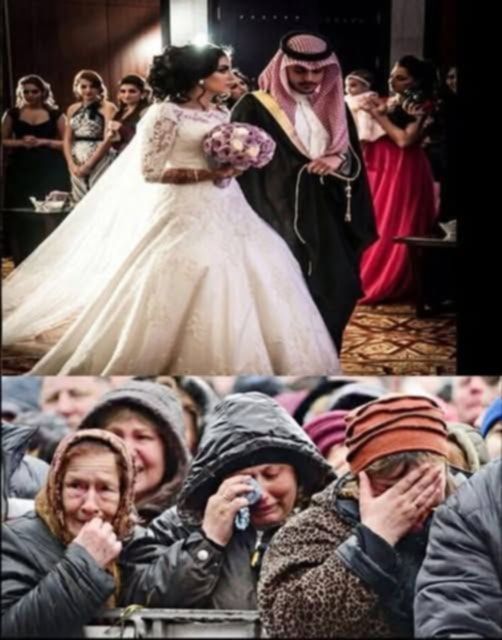When news broke that a young woman from rural England had married into one of Dubai’s wealthiest families, the story spread across social media like wildfire. The photos looked like scenes from a modern fairy tale: flowing gowns, crystal chandeliers, and gold-threaded veils glimmering under the desert lights. But within 24 hours, the sparkling love story unraveled into scandal, raising questions about who Soudi Al Nadak really was—and what she might be hiding.
Soudi was born in the quiet countryside of Kent, where life moved slowly among rustling leaves and morning fog. Her family lived modestly, waving to neighbors and gathering for Sunday roasts. She was bright, ambitious, and restless—a girl who felt destined for something beyond the hedgerows and narrow lanes of her childhood. In her early twenties, she earned a scholarship to study international business in Dubai—a leap from rain-soaked fields to glass towers that scraped the sky.
That’s where she met Jamal Al Nadak.
Jamal was everything Soudi was not: wealthy, confident, and born into a family with a long-standing reputation in the Gulf. Yet Jamal himself was quiet and reserved. He noticed Soudi not at a gala, but at a university seminar, where she challenged a professor on ethics in global trade. Jamal, seated two rows behind her, smiled quietly to himself.
Their relationship began quietly. No paparazzi, no staged posts, no drama. Friends described them as opposites who fit perfectly—her curiosity softened his caution, his calm steadied her ambition. Within a year, they were inseparable.
The proposal was private, but the wedding was grand.
On a spring evening in 2020, under the golden glow of the Burj Al Arab, Soudi walked down a mirrored aisle framed with orchids from Thailand and roses from Holland. Her gown, custom-made by a Lebanese designer, sparkled with tiny diamonds. Guests included royal acquaintances, influencers, and business leaders. The ceremony blended British elegance with Emirati splendor: tea service alongside oud incense, a string quartet harmonizing with Arabic drums.
Within hours of the wedding video being posted online, the internet exploded. Some were enchanted, calling it a modern fairy tale, while others were skeptical. Who was this girl who seemingly rose overnight from an unknown countryside to Dubai royalty?
The hashtags told the story: #DubaiBride, #GoldDigger, #LoveOrLuxury. Speculation ran wild: was she a dreamer or a strategist? Did she love Jamal, or the life he offered?
Then came the twist that made headlines.
A guest leaked a clip from the after-party—Soudi in tears, speaking sharply to one of Jamal’s cousins: “I didn’t sign up for this.” Within hours, gossip sites claimed the marriage was a business arrangement; others said Jamal’s family had never approved.
Soudi disappeared from the public eye for weeks. Her social media accounts went silent. Tabloids and YouTubers analyzed every frame of the leaked footage. Fashion magazines debated her motives. Relationship experts speculated on cultural clashes and power imbalances. The world had decided her story before she could speak.
Nearly two months later, she reappeared—alone.
In a long interview with Arabian Life Weekly, Soudi spoke calmly, dressed simply in linen: “People saw what they wanted to see,” she said. “They saw wealth and assumed manipulation. They saw a foreign woman and assumed she married for status. But love doesn’t care about the stories people build around it.”
She admitted there was tension. Adjusting to high Emirati society was harder than expected. “Expectations were overwhelming,” she explained. “You don’t just marry a person—you marry a family, a culture, a legacy. I was naive to think love alone could bridge the gap.”
As for the leaked video, she smiled faintly. “That moment was real. I was upset and said something I shouldn’t have. But not for the reasons people think. I was scared—scared I’d never truly belong.”
The marriage survived the media storm, though not unchanged. Jamal, always private, refused interviews. Friends say he was hurt by how quickly strangers turned his wife into a caricature. They withdrew from the spotlight, focusing on charity and small business projects. Soudi began supporting women-led startups, helping young girls in the UK and Middle East access education.
Still, the gossip never fully died. Some insisted she had orchestrated everything—the perfect image, the perfect match, the perfect rise. Others saw a woman who loved deeply but paid the price of being visible in a world addicted to spectacle.
Asked if she regretted anything, Soudi paused: “I regret underestimating how loud the world can be. When you’re from a small place, you think success is about being seen. But real peace is found in quiet—when you stop trying to prove your story to those who never cared to understand it.”
Today, five years later, Soudi and Jamal live largely out of the public eye. They split their time between Dubai and a modest farmhouse in England. Photos surface occasionally—a charity gala here, a family outing there—but they no longer chase the narrative. The noise has been replaced by something stronger than approval: privacy.
Yet their story remains a rare modern myth the internet can’t let go of—a collision of culture, ambition, and love in a world where everything is documented and judged. For some, it’s scandal; for others, a cautionary tale. But for those who look closer, it’s simply two people who fell in love and tried to survive the price of being watched.
As one commentator said: “Maybe she wasn’t chasing gold or glamour. Maybe she was just chasing belonging.”
And perhaps that is the part of the story the world never cared to hear.
